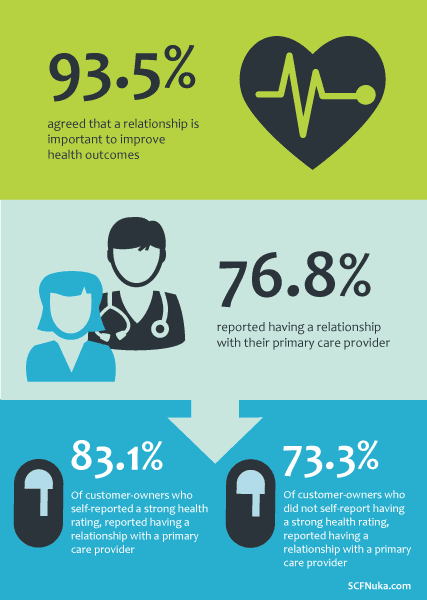The Impact of Relationship-Based Care
SCF undertook a major study on relationship-based care. The purpose of this study was to investigate whether customer-owners who are empanelled (chose to be assigned) to a primary care provider perceive that their relationship with that provider is important to improving their health, to evaluate the quality of that relationship, and to measure the impact of customer-owner and provider factors on the quality of the relationship and on health outcomes.
To study this, SCF conducted a survey with 2,126 empanelled customer-owners 18 years of age or older in SCF’s seven primary care locations. Those surveyed were empanelled to one of 41 primary care providers to investigate what customer-owner and primary care provider factors, if any, influence the relationship between a provider and a customer-owner to improve health outcomes. The factors considered included customer-owner and provider demographics, health care utilization, health outcomes and match rate (the percentage of time the customer-owner sees their chosen provider for primary care visit). The Consultation and Relational Empathy (CARE) Measure was used to assess the quality of the customer-provider relationship in addition to several other survey questions. We hypothesised that these factors would positively influence health outcomes, and we used multilevel regression analysis to analyse data collected at more than one level to understand multiple relationships.
Of the sample participants, 1,988 (93.5%) agreed that a relationship is important to improve health outcomes; 1,632 (76.8%) reported having a relationship with their primary care provider, and this figure was substantiated through analysis of the CARE Measures submitted by those customer-owners. Of customer-owners who self-reported a strong health rating, 83.1% (n=621) reported having a relationship with a primary care provider, compared to 73.3% (n=1,011) of those who did not report a strong health rating. The mean number of emergency department visits for those who responded with at least “Agree” on all items of the CARE measure was 1.9 (SD=2.4) compared to a mean of 2.4 (SD=4.3) for those who did not respond with at least “Agree” on all items.
 The results show that customer-owners believe that having a relationship with a provider is important to their health, and also suggest that strong relationships between providers and customer-owners may help customer-owners achieve better health outcomes. SCF supports its providers with extensive training to help them in their efforts to build relationships with customer-owners. These results show great promise for the practice of relationship-based care; this study can add valuable data to the conversation around methods to provide health care, and can serve as a basis for future research.
The results show that customer-owners believe that having a relationship with a provider is important to their health, and also suggest that strong relationships between providers and customer-owners may help customer-owners achieve better health outcomes. SCF supports its providers with extensive training to help them in their efforts to build relationships with customer-owners. These results show great promise for the practice of relationship-based care; this study can add valuable data to the conversation around methods to provide health care, and can serve as a basis for future research.
This study was discussed in more detail at a session at the conference for the Institute for Healthcare Improvement.




